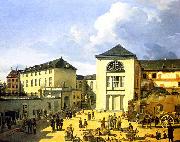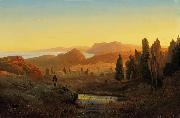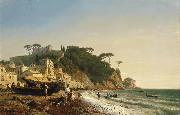Andreas Achenbach Huiler la Reproduction de TableauAll Andreas Achenbach Oil Paintings(September 29, 1815 - April 1, 1910) was a German landscape painter. Born at Kassel, he began his art education in 1827 in Desseldorf under Friedrich Wilhelm Schadow at the Desseldorf Academy of Painting. He studied at St Petersburg and travelled in Italy, Holland and Scandinavia.In his early work he followed the pseudo-idealism of the German romantic school, but on removing to Munich in 1835, the stronger influence of Louis Gurlitt turned his talent into new channels, and he became the founder of the German realistic school. Although his landscapes evince too much of his aim at picture-making and lack personal temperament, he is a master of technique, and is historically important as a reformer. The Chambers Biographical Dictionary says of him that "he was regarded as the father of 19th century German landscape painting." A number of his finest works are to be found at the Berlin National Gallery, the New Pinakothek in Munich, and the galleries at Dresden, Darmstadt, Cologne, Desseldorf, Leipzig and Hamburg. He died in Desseldorf. His brother, Oswald Achenbach (1827-1905), was also a painter. |
|||

|
|||
|
|
|||
|
||||||||||||
| Andreas Achenbach (September 29, 1815 - April 1, 1910) was a German landscape painter. Born at Kassel, he began his art education in 1827 in Desseldorf under Friedrich Wilhelm Schadow at the Desseldorf Academy of Painting. He studied at St Petersburg and travelled in Italy, Holland and Scandinavia.In his early work he followed the pseudo-idealism of the German romantic school, but on removing to Munich in 1835, the stronger influence of Louis Gurlitt turned his talent into new channels, and he became the founder of the German realistic school. Although his landscapes evince too much of his aim at picture-making and lack personal temperament, he is a master of technique, and is historically important as a reformer. The Chambers Biographical Dictionary says of him that "he was regarded as the father of 19th century German landscape painting." A number of his finest works are to be found at the Berlin National Gallery, the New Pinakothek in Munich, and the galleries at Dresden, Darmstadt, Cologne, Desseldorf, Leipzig and Hamburg. He died in Desseldorf. His brother, Oswald Achenbach (1827-1905), was also a painter. |
|
|||||||||||
|
|
||||||||||||
| ID de tableau:: 96513 Die alte Akademie in Dusseldorf Die alte Akademie in Dusseldorf 1831(1831) Medium oil Dimensions 64 X 81 cm cyf 1831(1831) Medium oil Dimensions 64 X 81 cm cyf |
||||||||||||
|
|
||||||||||||
| ID de tableau:: 97829 Paesaggio italiano Paesaggio italiano 1847(1847) Medium oil on canvas Dimensions 42 x 63 cm cyf 1847(1847) Medium oil on canvas Dimensions 42 x 63 cm cyf |
||||||||||||
|
|
||||||||||||
| ID de tableau:: 98010 Porto Venere am Ligurischen Meer Porto Venere am Ligurischen Meer 1853(1853) Medium oil on panel Dimensions 36 x 55 cm cyf 1853(1853) Medium oil on panel Dimensions 36 x 55 cm cyf |
||||||||||||
|
|
||||||||||||
| Artiste précédent Artiste prochain | ||||||||||||
|
|
||||||||||||
|
Andreas Achenbach (September 29, 1815 - April 1, 1910) was a German landscape painter. Born at Kassel, he began his art education in 1827 in Desseldorf under Friedrich Wilhelm Schadow at the Desseldorf Academy of Painting. He studied at St Petersburg and travelled in Italy, Holland and Scandinavia.In his early work he followed the pseudo-idealism of the German romantic school, but on removing to Munich in 1835, the stronger influence of Louis Gurlitt turned his talent into new channels, and he became the founder of the German realistic school. Although his landscapes evince too much of his aim at picture-making and lack personal temperament, he is a master of technique, and is historically important as a reformer. The Chambers Biographical Dictionary says of him that "he was regarded as the father of 19th century German landscape painting." A number of his finest works are to be found at the Berlin National Gallery, the New Pinakothek in Munich, and the galleries at Dresden, Darmstadt, Cologne, Desseldorf, Leipzig and Hamburg. He died in Desseldorf. His brother, Oswald Achenbach (1827-1905), was also a painter. |
||||||||||||
|
|
||||||||||||
|
CONTACTER DES Etats-Unis |








